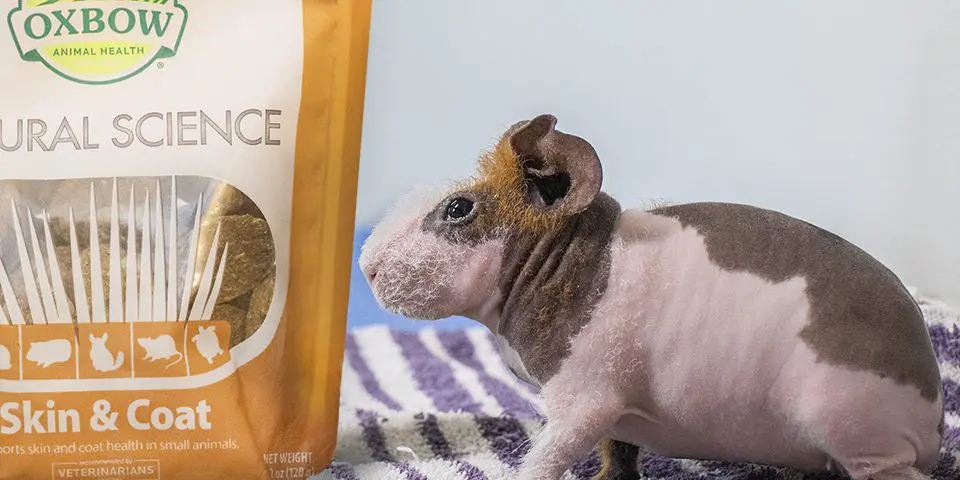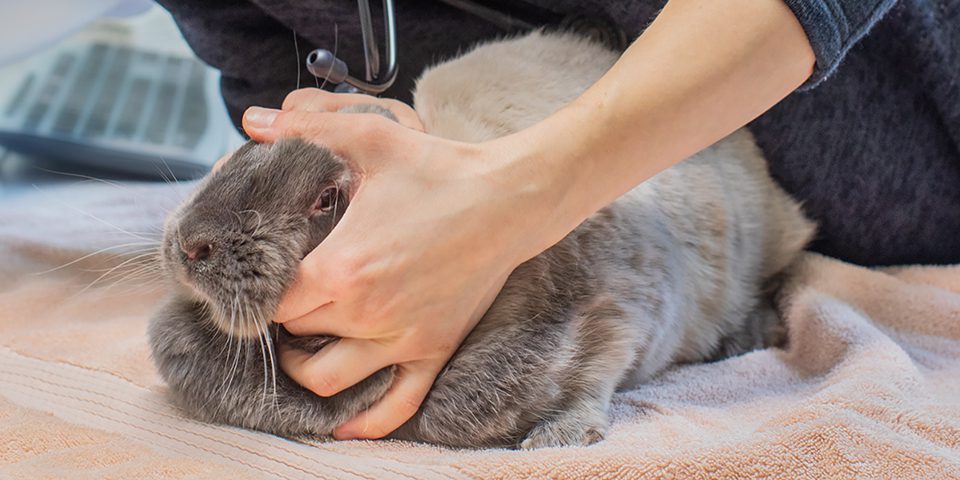Author: Pattie Larson, LVT
Updated: May 9, 2023
As the world wakes up each spring, hundreds of us will flock to doctors and pharmacies in search of medications to help control our allergies. Veterinarians will similarly see an influx of pets coming in with the onset of symptoms ranging from sneezing, and drippy-eyed dogs to scratching, irritated kitties, and everything in between.
You may be more familiar with dog and cat allergies, but what about smaller pets like rabbits, guinea pigs, hamsters, and others? Can your rabbit, guinea pig, or other small mammal suffer from allergies as well? The short answer is “YES!”
Small Pet Allergies Are More Common Than You May Think
Allergies in small pets like rabbits and guinea pigs are not as prevalent as with other species like dogs and cats, but they are not uncommon.
- Rabbits can be allergic to mites, strong scents, or even the hay they rely on for dietary fiber.
- Guinea pigs can acquire food allergies from pellets they have eaten for years.
- Hamsters can suffer from allergic reactions to their bedding.
- Ferrets can have a sudden allergic reaction to a new household cleaner.
Pet allergies can be chronic or fleeting, but, no matter what, they can cause you a lot of worries. So, what steps should you take if your beloved bunny, ferret, or hamster suffers from allergies? First, let’s talk about the most common types of allergies and the symptoms you may see in your little friend.
Common types of allergies in small pets include:
- Food allergies
- Environmental allergies

Food Allergies in Small Animals
Food allergies tend to manifest most commonly in skin and coat issues. If your pet is suffering from a food allergy, you may notice signs of itchy skin, skin rashes, or skin irritation. Your pet may be itching and scratching themselves or scooting across the floor more than normal.
You may see spots of alopecia (hair loss) from scratching or over-grooming, or pruritus (itchy, red, scaly skin) that can even lead to small wounds or pustules from chronic scratching. Food allergies can also manifest in ear problems, such as chronic secondary ear infections.
Environmental Allergies in Small Animals
There are many types of allergens present in your pet’s environment, which can make them somewhat difficult to rule out. Some environmental allergens are airborne, affecting your pet’s respiratory system in the form of sneezing, or watery, red, itchy eyes. Some allergens can cause contact dermatitis issues when your pet encounters them on a surface.
Common causes of environmental allergies include:
- Hay Dust
- Bedding
- Household irritants such as air fresheners, cleaning products, perfumes, essential oils, and smoke from cigarettes, fireplaces, or cooking.
- Mites and Fleas
- Other Pets
How To Prevent Pet Allergy Attacks
The first and most important part of prevention is learning the cause of your little one’s allergy. To accomplish this, you will want to work with your veterinarian to identify the cause. Your veterinarian can provide a physical examination and diagnostic testing that will be instrumental in helping your pet feel better.
Consider the following questions before heading into your allergy appointment:
1) Have there been any changes to your pet’s routine?
- Have you introduced your pets to any new food, bedding, treats, and cleaners?
- Have you taken your pet outside recently?
2) Have there been any changes in their environment?
- Did you recently move your pet’s habitat to a different area of the home?
- Are you using any new cleaning products, detergents, or personal products?
- Have you welcomed a new pet to the family?
3) What kind of food are you currently feeding your pet? Include a list of treats and fresh food items you are offering as well.
4) What kind of bedding do you use in your pet’s habitat?
5) Have you noticed any changes in the appearance, texture, or smell of the items you are using that may indicate a change in the products?
6) Is your pet currently taking any medications? What are they?
7) Have you recently used any flea or tick maintenance products on your pets?
Your veterinarian may recommend a trial period of removing an item or product to see if the symptoms improve. This is particularly common for suspected food allergies.
They may suggest switching your pet to a different food, after a transition period of 8 to 10 weeks to see if skin conditions improve.
Once you have discovered the cause of your pet’s allergy, it’s a matter of either keeping it away from them or decreasing the opportunity for an allergy flare up.
In consultation with your vet, once you have found the allergen and have removed it from their environment, skin supplements for small mammals such as Oxbow’s Natural Science Skin and Coat may help your little one in repairing their skin and fur.
Does Your Pet Have Hay Allergies? Try Different Varieties!
Hay should make up approximately 70% of your herbivore’s daily diet and should be offered in unlimited amounts all the time. Hay is not something that should be removed from your pet’s daily routine. Animals with hay allergies may find relief by switching to a different variety of hay. Oxbow offers a large variety of different options for you to try, including our Harvest Stacks which have 80% less airborne dust than our bagged varieties.
To minimize dust, you can take your hay out of the bag and shake it well in a large plastic container or colander before offering it to your little one. Lightly misting your pet’s daily hay portion can also cut down on airborne dust, but you will want to be very careful not to get the hay too wet and check or remove it often to make sure that there is no mold.
Allergies may seem like a daunting complaint to deal with but with your veterinarian’s help and some patience your furry friend can feel so much better!


